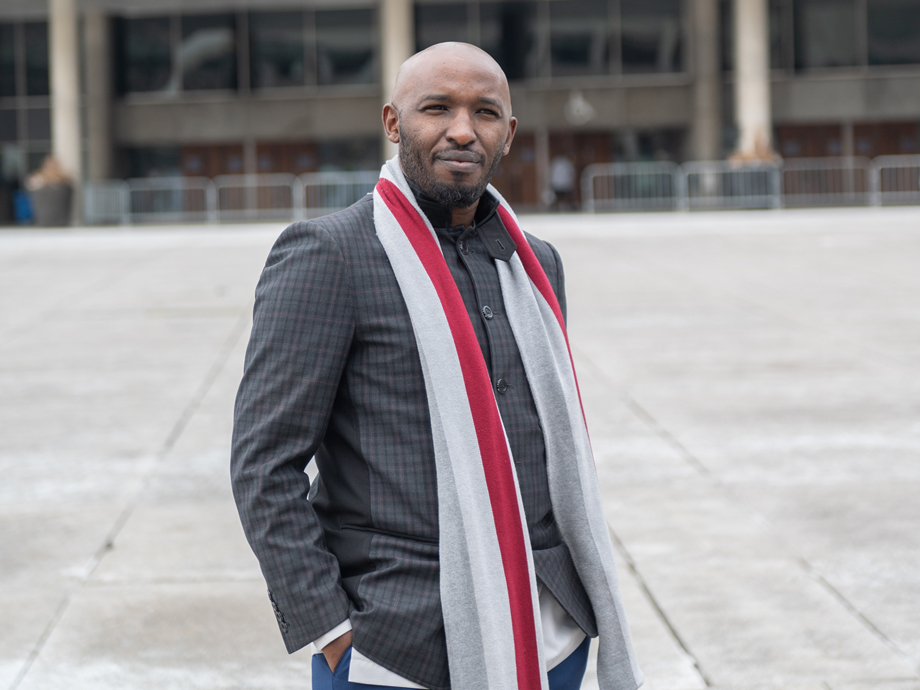Village concept offers African-Canadian housing solution
March 6, 2024
AT A GLANCE
- Kizito Musabimana was 11 years old when he witnessed the 1994 genocide against the Tutsis in Rwanda.
- Moving to Canada as a teenager, storytelling was one of the tools that helped him to heal from his trauma. Later, he created the Rwanda Canadian Healing Centre to help others in a similar situation.
- Recognizing the role that safe, affordable housing plays in a healing journey, Kizito brought community partners together with a leadership team for the African-Canadian Housing Solutions Lab.
- The African-Canadian Housing Solutions Lab team created a prototype village using traditional values and concepts to promote healing, inclusion and a sense of belonging.

“We call it a village, but that doesn’t mean we want to build it in the middle of nowhere.”
Kizito Musabimana is leading a team with an ambitious vision—to create Toronto’s first multi-generational African-Canadian housing village.
“We have 2 concepts,” he says. “With the Mini Village we want at least 300 units. The Ultimate Village is up to 1,000 units.”
The goal is to establish both villages by 2030.
The roadmap to realizing his vision was developed during The African-Canadian Affordable Housing Solutions Lab.
“The challenges facing the African Canadian community in Canada are similar to those facing Indigenous and other racialized communities,” says Kizito. “It’s not just about affordable housing. Our community is lacking a sense of belonging and inclusion.”

L to R: Peter Kagotho, program manager, Kenyan Canadian Association; Kizito Musabimana, executive director, Rwandan Canadian Healing Centre;
Juliet Opoku, health and wellness educator; Jonathan Okubay, executive director, New Nafka.
Kizito’s story
Kizito was born in Rwanda. When he was 11 years old, he witnessed the genocide against the Tutsi people. He moved to Canada as a teenager and later enrolled at Toronto Film School.
Storytelling helped him to work through his trauma and it’s still something he wants to do.
“The thing I love about how I’ve internalized it, is that it’s not, ‘Why Me?’ Not everything about our nation is beautiful. But if you want to see beauty, there is beauty. And that’s what I focus on. I believe my purpose is to tell successful Afri-Canadian stories. And where I don’t have those stories, my call is to make them happen.”
In 2018, with the support of the Rwandan Canadian community, Kizito founded the Rwandan Canadian Healing Centre. The Toronto-based non-profit organization helps Rwandan Canadians, and members of the Black Canadian community, to overcome traumatic experiences from genocides, war and other catastrophic events.
I believe my purpose is to tell successful Afri-Canadian stories. And where I don’t have those stories, my call is to make them happen.
He initially envisioned a trauma centre where those with lived experience could gather, grow and heal. He realized that to heal, people needed something more. They need a place where they feel safe and secure.
“Housing plays a key role in the mental health of individuals, and of a community,” says Kizito.

Understanding the need, defining the challenge
For the Solutions Lab, Kizito assembled a core team that included representatives from, and advocates for, the African-Canadian community as well as stakeholders, strategists, architects and designers.
What are Solutions Labs?
- Solutions Labs are also called social innovation labs, design labs, or change labs. They’re an innovative approach to tackling complex societal challenges that require systems change.
- They provide a safe space for diverse perspectives to come together, for assumptions to be questioned and to experiment with housing solutions.
- Organizations receive funding to create project teams. They are encouraged to bring together a variety of stakeholders to gather diverse perspectives on an issue
Over the course of several months, the team conducted surveys, focus groups, presentations, and interviews. They spoke with housing experts, city planners and people with lived experience across Canada.
“Developing a deep understanding of the housing situation for continental African Canadians across the country was crucial,” says Kizito.
Comfort, convenience and interconnectedness
Lab participants were asked to envision their dream homes and to explore what housing meant to them, beyond a physical structure.
“I think a key thing that came up was a comfortable space,” says Kizito. “And a lot of the time the struggle is how do you make something both comfortable and affordable. I think we managed to meet in the middle by not necessarily by designing larger spaces but by creating the interconnectedness piece.”
When he was growing up in Nairobi, everyone said ‘Hello’ to each other. When he came to Canada and said Hello to people, “they were like, ‘I don’t know you.’ African Canadians are missing the interconnectedness and support that is a part of our culture.”
Part of the challenge for Toronto residents is that they often live far away from everyday services.
“If you want to cut your hair, especially for black people, you have to go across the city,” says Kizito.
The Mini Village tackles this issue head on, by bringing together African-Canadian businesses, recreational spaces, healthcare providers and supports services with African-Canadian residents, in a walkable community.
The challenge for most families is not just rent, it’s everything else around it…food, community. We want to find a way, through the model, to reduce these costs and create a better living environment.
The village prototype includes central lobbies so that when someone leaves their home, they are immediately immersed in an environment which encourages connection. These spaces would also host events, workshops, gatherings and provide easy access to stores and services.
“And then of course there’s the intergenerational piece,” says Kizito.
“In the evening, [in Africa] we go around the fire. Seniors tell stories. Young people sit and listen. Seniors in our tradition are the most important people.”
Kizito says most people who participated in the focus groups said that [in Canada] the idea of having a senior live in a group home is normal. As a result, “Seniors would rather go back and live in Africa and that’s really what most of us tend to do.”
The result is a lack of guidance from elders.
“We want to capture that knowledge. That wisdom.”
By incorporating these elements, the team hopes develop a thriving, sustainable community, and a replicable model.
Finding the land
The anticipated timeline for the Mini Village is 3 years.
“We are working with the City of Toronto right now to secure the land,” says Kizito.
If the team cannot secure a suitable piece of land in the city, they are willing to explore areas a little further afield where land may be more affordable.
With the Mini Village we want at least 300 units. The Ultimate Village is up to 1,000 units. We believe we will get there in 7 to 10 years.
They are also exploring various funding models, such as community bonds, which would enable the community, and possible future residents, to invest directly in the Mini Village.
While the immediate focus is the Mini Village, Kizito’s team is simultaneously exploring land opportunities for the Ultimate Village, including the former Downsview Airport.
“We believe we will get there in 7 to 10 years,” he says.

L to R: Peter Kagotho, program manager, Kenyan Canadian Association; Juliet Opoku, health and wellness educator; Jonathan Okubay, executive director, New Nafka; Kizito Musabimana, executive director, Rwandan Canadian Healing Centre.
Focus on partnerships
The key to the success of both the Mini Village and Ultimate Village, is partnerships.
As his team at the Rwanda Canadian Healing Centre continues to grow, Kizito is able to leave some of the admin work behind.
“My primary focus in 2024 is building relationships,” he says.
With a network of approximately 15 organizations and partners providing a variety of resources, support and services, Kizito believes the organization is well positioned to develop the concepts and realize their vision.
“The success of the project hinges on collaboration, community engagement, and policy advocacy.”
Writing a new story
The lab team anticipates that the village concepts will serve as a catalyst for change, inspiration, and advocacy among African Canadians.
They also hope their model could empower other communities to address housing affordability.
“Often, research and problem-solving are seen as the domain of experts and academics, distancing community members from the solutions,” says Kizito. “We are challenging that perception.”
Ultimately, Kizito hopes to write a new story. One that marks a significant step toward more equitable and inclusive housing solutions for African Canadians across the country.
KEY FACTS
- The African Canadian Affordable Housing Solutions Lab was funded by NHS Solutions Lab, a National Housing Strategy initiative. The initiative provides funding to examine persistent, complex housing solutions and rapidly develop solutions.
- The African Canadian Affordable Housing Solutions Lab is led by the Rwandan Canadian Healing Centre in partnership with Overlap Associates, New Nafka, Casa Design Consult, Kenyan Canadian Association, Network for the Advancement of Black Communities and the Ghanaian Canadian Association of Ontario.
- Additional support and guidance provided by Greater Toronto Area Rwandan Canadian Collective, Rwandan Community Abroad, Canadian Association of Rwandan Youth Toronto, Heritage Association, (UMURAGE Series), Beyond the Veil Mission, and the Rwandan Canadian Community of Hamilton.
SEE ALSO
- Project Profile: African Canadian Affordable Housing Lab | CMHC (cmhc-schl.gc.ca)






 Share via Email
Share via Email
